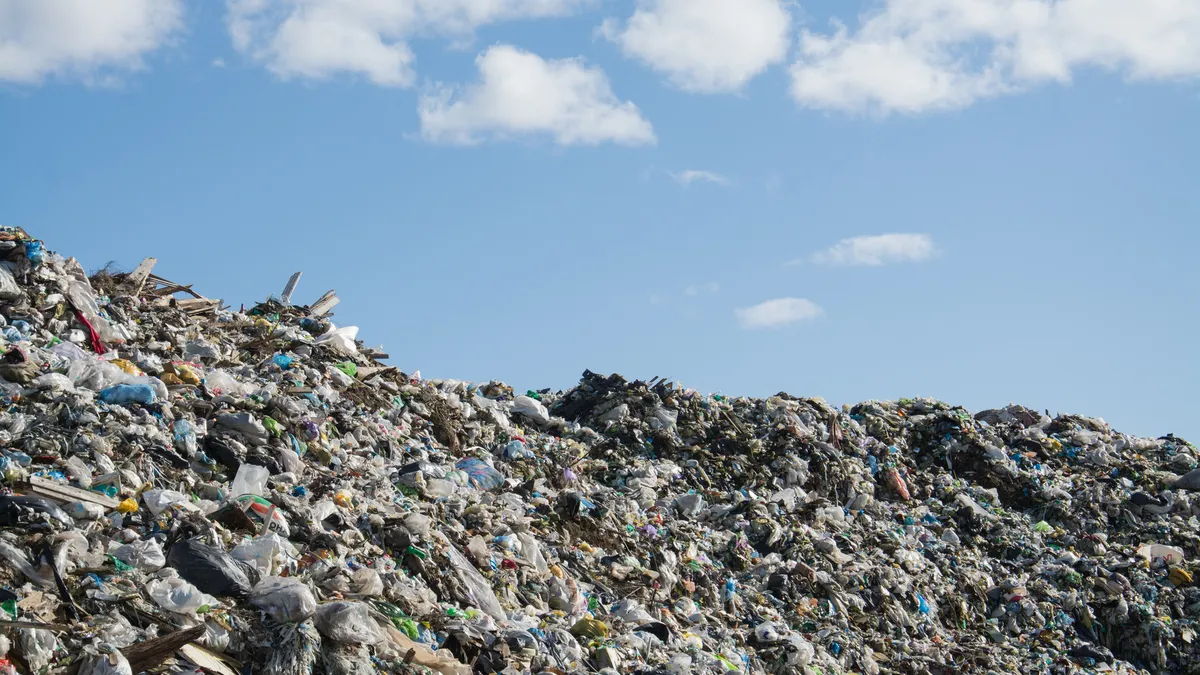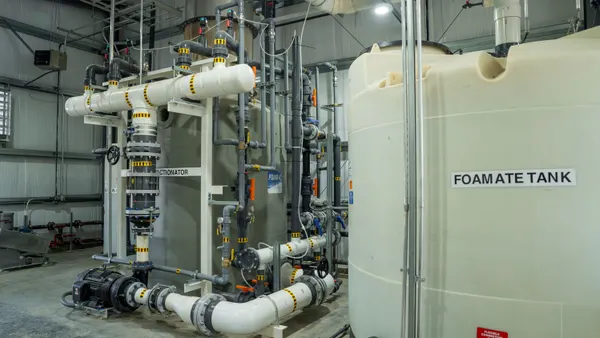UPDATE: March 25, 2022: Washington Gov. Jay Inslee is scheduled to sign HB 1663 on Friday. The law would make methane emissions monitoring and capture requirements more strict at certain landfills in the state.
Dive Brief:
- A bill that aims to reduce Washington's methane emissions by making landfill gas reporting and capture rules stricter recently passed the state legislature. Lawmakers who sponsored HB 1663 expect Gov. Jay Inslee to sign the bill March 25.
- The bill would require numerous MSW landfills — including active landfills with 450,000 tons or more of waste in place and closed landfills with at least 750,000 tons of waste — to report gas generation calculations and install methane gas capture and control systems if calculations reach a certain threshold.
- The bill brings the state in line with similar emissions standards in California, which established its regulations in 2010, and Oregon, which implemented its own landfill emissions regulations in October and are now considered the strictest in the U.S.
Dive Insight:
Curbing methane emissions from landfills is a key way Washington aims to meet its greenhouse gas reduction goal of cutting total emissions 95% from 1990 levels by 2050. Landfills in Washington emit about 1.5 million metric tons of carbon dioxide equivalent each year, according to a bill report, and some of these landfills are not currently required to manage methane emissions under the Clean Air Act.
This bill would require the owner or operator of some active MSW landfills that received solid waste after Jan. 1, 1992, to estimate how much gas the landfill generates. Operators will need to install a gas collection and control system if landfill gas heat input capacity calculations meet or exceed 3 million British thermal units per hour, unless the operator can show a series of quarterly surface monitoring reports indicating methane concentration is less than 200 parts per million, according to the bill.
Landfills that are exempt from the bill include those that handle only hazardous waste or inert or non-decomposable waste. Smaller landfills with fewer than 450,000 tons of waste in place won’t need to submit landfill gas estimates or be required to install gas capture systems, but will need to submit an annual waste-in-place report, according to the bill.
If signed, bill sponsor Rep. Davina Duerr said the Washington Department of Ecology will still need to adopt rules to implement the provisions of the bill, meaning it could take several years before landfills would need to start complying with certain aspects of the regulations.
Supporters applauded the bill’s passage, saying the tighter rules will help curb an important source of greenhouse gas emissions in a time when every reduction counts. Although transportation accounts for the majority of the state’s total greenhouse gas emissions, methane from Washington’s landfills and wastewater treatment make up about 2.4%, according to a 2021 Department of Ecology report.
“We know methane is being emitted from landfills, and if it's going to keep being emitted for quite a long time, let’s tighten down the standards now and get the collection systems in place,” said Heather Trim, executive director of Zero Waste Washington, which supported the bill.
Supporters say more work to curb methane emissions is necessary because recent studies suggest the U.S. EPA has underestimated the country’s methane emissions, particularly from oil and gas. Trim thinks advances in monitoring and measuring technology could reveal more accurate data about just how much Washington’s landfills emit, too.
“The bottom line is that we don't quite know how much methane is being emitted, but hopefully this bill will help provide better data on that,” added Deepa Sivarajan, a clean buildings policy manager for energy nonprofit Climate Solutions, which also supported the bill.
The bill also garnered opposition, notably from Republicans who felt the bill won't incentivize landfills to take full advantage of technology improvements and innovation to make money from turning methane into electricity or renewable natural gas. Instead, the bill allows too much flexibility to flare methane instead of capture it, said Rep. Mary Dye, ranking minority member of the House Environment & Energy Committee. Dye initially opposed the bill when it was considered in her committee, but “reluctantly” voted in favor of it last week, saying she hopes to work with Democrats on finding a balance between reducing emissions and boosting renewable natural gas business.
“Landfills are a lot more complicated than this bill takes into account,” she said.
Dye also felt the bill was an “unfunded mandate” that puts undue costs on operators for required infrastructure. She worries landfills may pass costs on to customers.
During February hearings for the bill, county landfill operators also voiced concerns over the costs for air monitoring and implementing gas management infrastructure, particularly for closed landfills that can no longer rely on revenue from tip fees. The Washington State Association of Counties was among the opponents to earlier versions of the bill, but a spokesperson for the association did not return calls for comment on their position at the bill’s final passage as of press time.
“Counties really are in a difficult position and have legitimate concerns on this,” said Rep. Joe Fitzgibbon, one of the bill’s cosponsors. “They really rely on tip fees for revenue, and at the same time, [Washington] has worked to reduce the amount of waste going to landfills, which has constrained county solid waste facilities further.”
The Washington Refuse and Recycling Association was not opposed to the bill, and WM, which has one privately run landfill that will be covered under the bill, said it supports the measure. “HB 1663 establishes important reporting and management requirements in Washington State to support the state’s climate change commitments,” wrote Janette Micelli, WM’s director of external affairs, in an email.
Reps. Duerr and Fitzgibbon said they plan to use funding from the state’s upcoming Climate Commitment Act to help landfill operators, particularly county landfills, pay for upgrades required by the bill. HB 1663 includes language that expands the CCA’s scope of funding to include money from that legislation and prioritizes local governments as recipients.
“I made a commitment that once we have a better idea of the bill’s scope, to start going after dollars, and I'm hopeful that the governor's office will help by putting that in his budget as well next year,” Duerr said.
Lawmakers and supporters also see HB 1663 as part of a larger waste reduction effort that ties in with another recently passed organics management bill, HB 1799, that aims to reduce organic waste disposal 75% by 2030 and increase edible food recovery 20% by 2025.
“Our number-one goal is to reduce organic material going to the landfill so we don't have any landfill gas at all, and HB 1799 gets the ball rolling on that,” Trim said.











